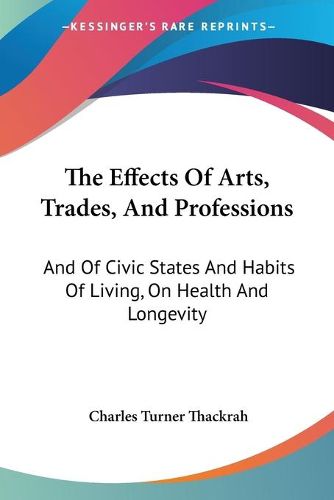Readings Newsletter
Become a Readings Member to make your shopping experience even easier.
Sign in or sign up for free!
You’re not far away from qualifying for FREE standard shipping within Australia
You’ve qualified for FREE standard shipping within Australia
The cart is loading…






Purchase of this book includes free trial access to www.million-books.com where you can read more than a million books for free. This is an OCR edition with typos. Excerpt from book: tea-table phraseology,
catch their death of cold ? The inhabitants of this country are brought up from childhood in the fear of taking cold. It is the bugbear of our youth; it haunts us through life. Few have any distinct ideas of the nature of this frigorific agency: few have fairly examined their experience: . and few indeed are aware [of the fallacies of experience; scarcely any have made either direct experiment or close observation. Yet all speak with decision on the subject. Hence workmen, when interrogated on the effects of change of temperature in producing coughs and catarrhs, commonly reply from their prejudices, rather than their observation.
We must take cold: we are always in heats and cools. But on cross-questioning them, I have not been able to satisfy myself, that men subject to the greatest changes are especially liable to catarrhs and bronchial inflammation. We do not hear more coughs in the foundries, dry-houses, or press-shops, than in other places. The men, it is clear, are not particularly subject to consumption; and if the heat or transitions of their employ frequently excited bronchial inflammation, a pathologist would surely expect the prevalence of that fatal disease. Having thus examined the effects of the principal occupations of the labouring classes, we proceed to the second great class, ? II. Dealers. These are chiefly Shopkeepers, who live in a confined atmosphere, and whose employments are a compound of the active and sedentary, with generally, however, more of the latter than the former. The character of their occupation is modified by the articles in which they deal; but, with some slightexceptions, they are subjected to no deleterious effluvium. They are, however, much too confined. Standing behind the counter all day, or sitting in …
$9.00 standard shipping within Australia
FREE standard shipping within Australia for orders over $100.00
Express & International shipping calculated at checkout
Purchase of this book includes free trial access to www.million-books.com where you can read more than a million books for free. This is an OCR edition with typos. Excerpt from book: tea-table phraseology,
catch their death of cold ? The inhabitants of this country are brought up from childhood in the fear of taking cold. It is the bugbear of our youth; it haunts us through life. Few have any distinct ideas of the nature of this frigorific agency: few have fairly examined their experience: . and few indeed are aware [of the fallacies of experience; scarcely any have made either direct experiment or close observation. Yet all speak with decision on the subject. Hence workmen, when interrogated on the effects of change of temperature in producing coughs and catarrhs, commonly reply from their prejudices, rather than their observation.
We must take cold: we are always in heats and cools. But on cross-questioning them, I have not been able to satisfy myself, that men subject to the greatest changes are especially liable to catarrhs and bronchial inflammation. We do not hear more coughs in the foundries, dry-houses, or press-shops, than in other places. The men, it is clear, are not particularly subject to consumption; and if the heat or transitions of their employ frequently excited bronchial inflammation, a pathologist would surely expect the prevalence of that fatal disease. Having thus examined the effects of the principal occupations of the labouring classes, we proceed to the second great class, ? II. Dealers. These are chiefly Shopkeepers, who live in a confined atmosphere, and whose employments are a compound of the active and sedentary, with generally, however, more of the latter than the former. The character of their occupation is modified by the articles in which they deal; but, with some slightexceptions, they are subjected to no deleterious effluvium. They are, however, much too confined. Standing behind the counter all day, or sitting in …